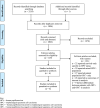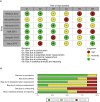The changing face of head and neck cancer: are patients with human papillomavirus-positive disease at greater nutritional risk? A systematic review
- PMID: 35477809
- PMCID: PMC9385807
- DOI: 10.1007/s00520-022-07056-9
The changing face of head and neck cancer: are patients with human papillomavirus-positive disease at greater nutritional risk? A systematic review
Abstract
Purpose: Human papillomavirus (HPV) is now the primary cause of oropharyngeal head and neck cancer (OPC) worldwide; yet limited research has examined the effect of HPV-positive status (OPC+) on nutrition outcomes. This study aims to determine the impact of HPV status on nutritional outcomes for adult patients with OPC undergoing any treatment modality.
Methods: A systematic literature review was conducted up to and including July 2021 of PubMed, Embase, CENTRAL, CINAHL, and Web of Science to identify studies conducted in adults (>18 years) with known OPC reporting on any outcome(s) related to nutrition, according to HPV status (OPC+ versus OPC-). Bias was assessed using QUIPS tool, with certainty of evidence assessed using GRADE system.
Results: Six studies (total n = 635) all at moderate-high risk of bias were included. Three studies reported on weight change (n = 255), three feeding tube dependency (n = 380), three feeding tube timing of placement (prophylactic or reactive) and/or utilisation (n = 255), two nutritional (energy and/or protein) intake (n = 230), and one nutritional status (n = 83). Patients with OPC+ may experience greater weight loss, may have higher utilisation of reactive feeding tubes (both GRADE low certainty, downgraded due to serious bias and imprecision), and may have lower feeding tube dependency rates (GRADE low certainty, downgraded due to serious bias and inconsistency) versus OPC- . It is uncertain whether nutritional intake and nutritional status differed between populations (GRADE very low certainty, downgraded due to serious bias and very serious imprecision).
Conclusion: Further, high-quality research is needed to understand optimal nutritional care practices for patients with OPC + to achieve positive health outcomes into survivorship.
Keywords: Human papillomavirus; Malnutrition; Nutrition; Nutrition support; Oropharyngeal cancer; Weight loss.
© 2022. The Author(s).
Conflict of interest statement
The authors declare no competing interests.
Figures


References
-
- Citak E, Tulek Z, Uzel O. Nutritional status in patients with head and neck cancer undergoing radiotherapy: a longitudinal study. Support Care Cancer. 2019;27:239–247. - PubMed
-
- Levendag PC, Teguh DN, Voet P, van der Est H, Noever I, de Kruijf WJM, Kolkman-Deurloo I-K, Prevost J-B, Poll J, Schmitz PIM, Heijmen BJ. Dysphagia disorders in patients with cancer of the oropharynx are significantly affected by the radiation therapy dose to the superior and middle constrictor muscle: a dose-effect relationship. Radiother Oncol. 2007;85:64–73. - PubMed
-
- Capuano G, Grosso A, Gentile PC, Battista M, Bianciardi F, Di Palma A, Pavese I, Satta F, Tosti M, Palladino A, Coiro G, Di Palma M. Influence of weight loss on outcomes in patients with head and neck cancer undergoing concomitant chemoradiotherapy. Head Neck. 2008;30:503–508. - PubMed
Publication types
MeSH terms
LinkOut - more resources
Full Text Sources
Medical

